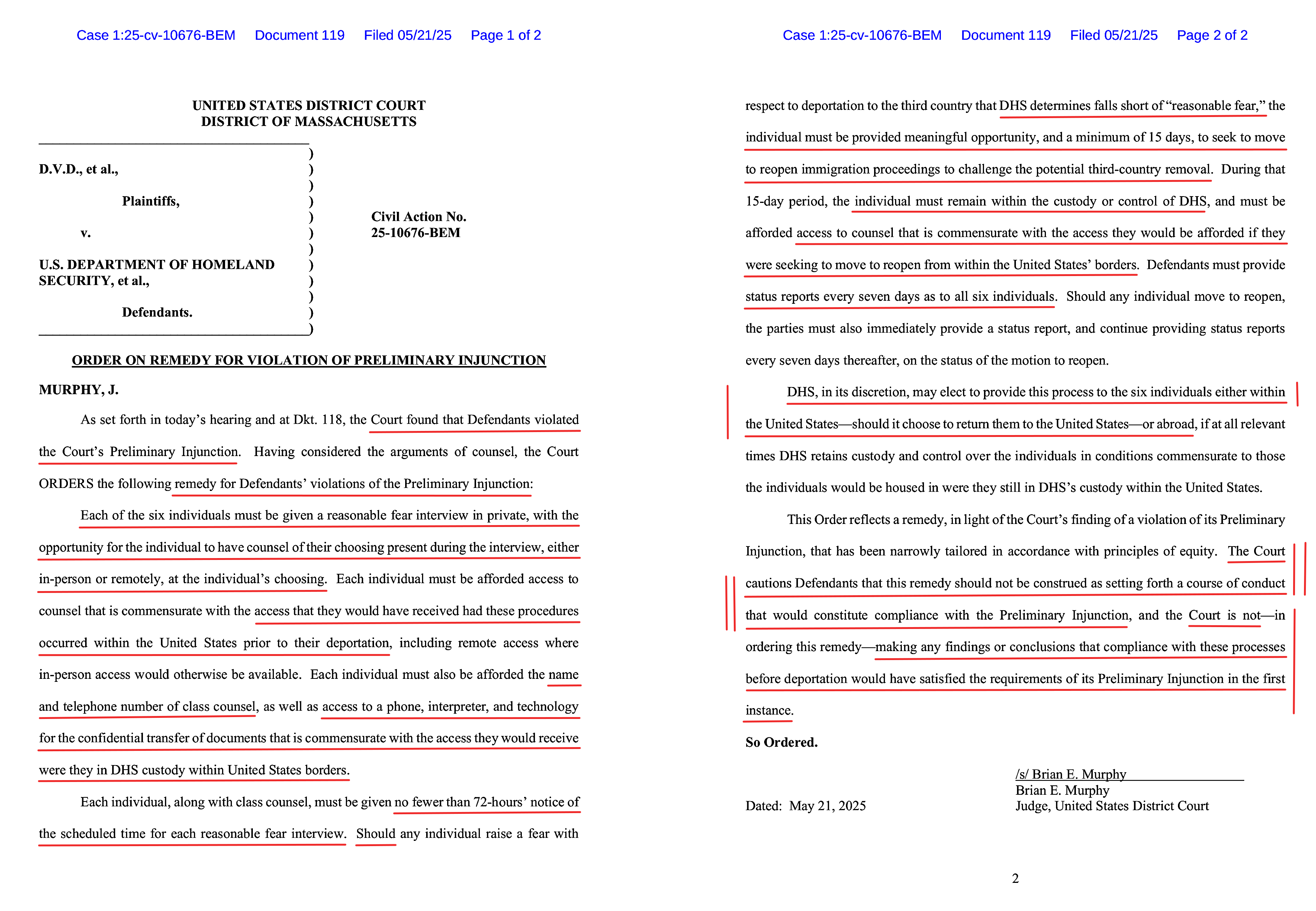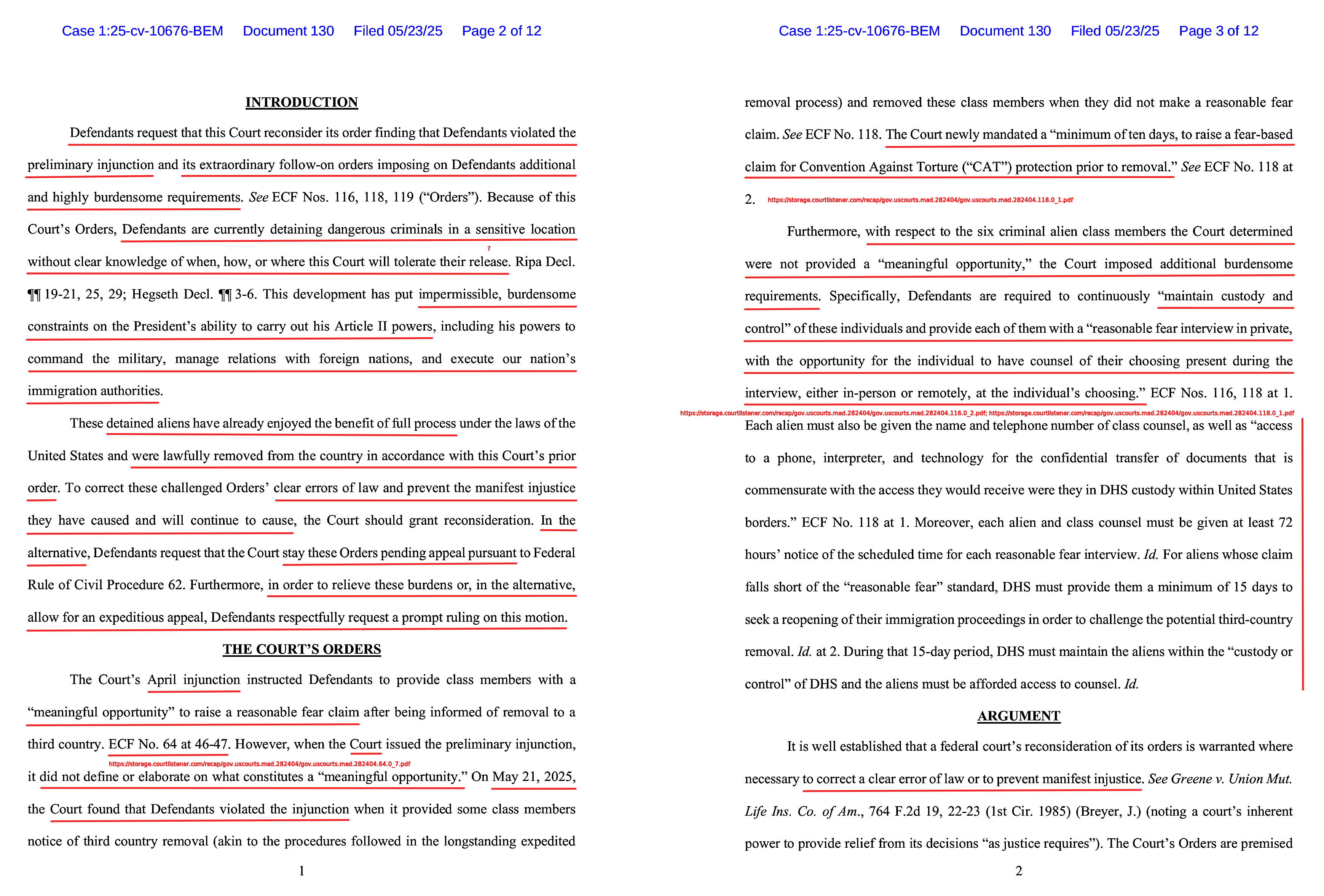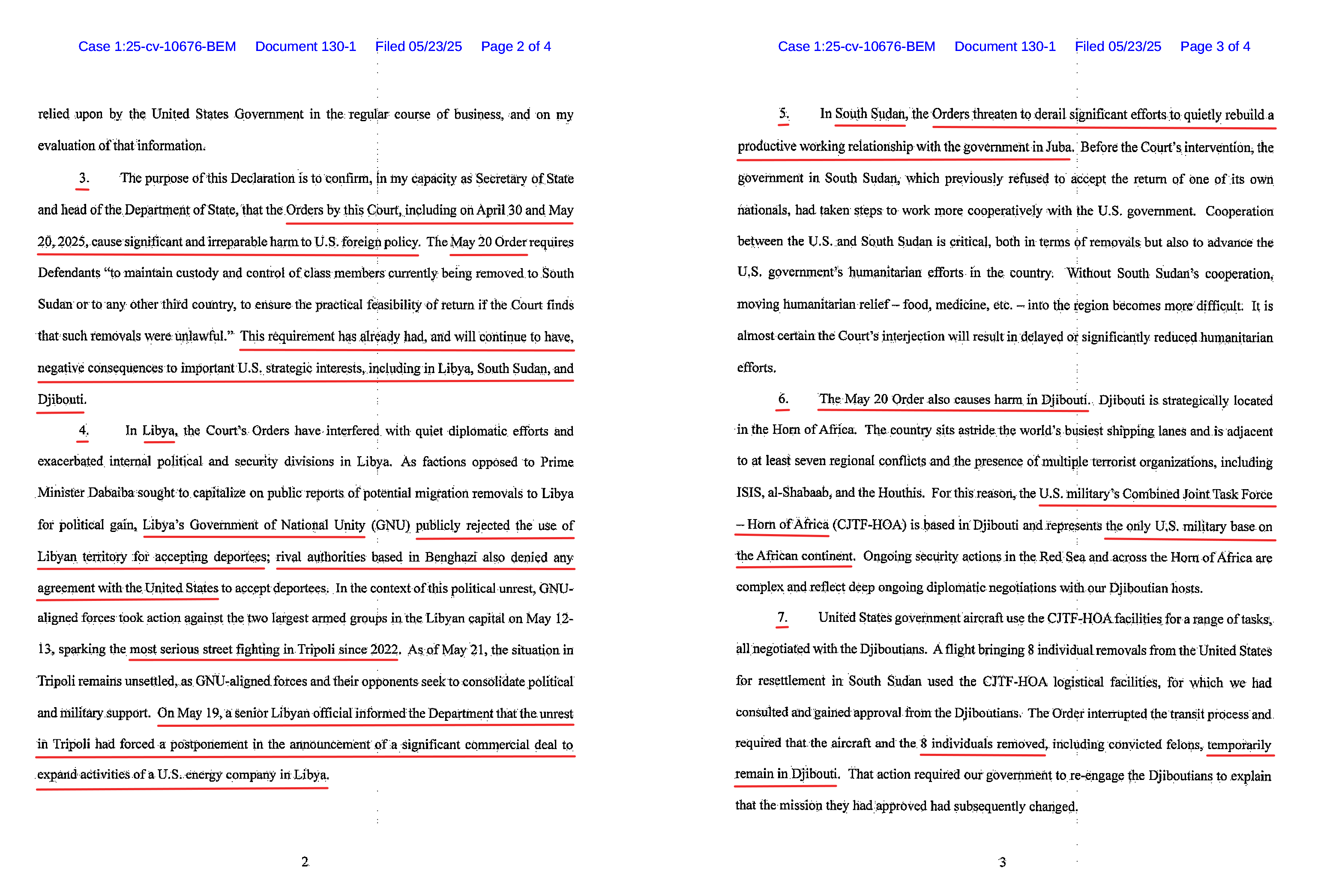.
I. Die Vorgeschichte
1. Dienstag, den 20. Mai 2025 (Dkt. 116)
Wie am Donnerstag berichtet, hatte der District Court Massachusetts am Dienstag entschieden:
„At today’s emergency hearing, the Court ordered Defendants to maintain custody and control of class members currently being removed to South Sudan or to any other third country, to ensure the practical feasibility of return if the Court finds that such removals were unlawful. While the Court leaves the practicalities of compliance to Defendants‘ discretion, Defendants have ensured, and the Court expects, that class members will be treated humanely.The Court has further ordered that Defendants be prepared at tomorrow’s prescheduled hearing to identify by name the affected class members and to address: (1) the time and manner of notice each individual received as to their third-country removal; and (2) what opportunity each individual had to raise a fear-based claim. In the event that Defendants determine that N.M. is not a class member, or was otherwise removed to any country other than South Sudan, Defendants must nonetheless be prepared to address the details of his removal, including when and to where he was removed, the names of individuals personally involved in executing his removal, and any information currently in Defendants‘ possession regarding his current whereabouts.“
(https://www.courtlistener.com/docket/69775896/dvd-v-us-department-of-homeland-security/?filed_after=&filed_before=&entry_gte=&entry_lte=&order_by=desc#entry-116)
2. Mittwoch, den 21. Mai 2025
Am Mittwoch kamen u.a. folgende Entscheidungen hinzu:
a) Dkt. 118
„All removals to third countries, i.e., removal to a country other than the country or countries designated during immigration proceedings as the country of removal on the non-citizen’s order of removal, see 8 U.S.C. § 1231(b)(1)(C), must be preceded by written notice to both the non-citizen and the non-citizen’s counsel in a language the non-citizen can understand. Dkt. 64 at 46–47. Following notice, the individual must be given a meaningful opportunity, and a minimum of ten days, to raise a fear-based claim for CAT protection prior to removal. See id. If the non-citizen demonstrates ‚reasonable fear‘ of removal to the third country, Defendants must move to reopen the non-citizen’s immigration proceedings. Id. If the non-citizen is not found to have demonstrated a ‚reasonable fear‘ of removal to the third country, Defendants must provide a meaningful opportunity, and a minimum of fifteen days, for the non-citizen to seek reopening of their immigration proceedings. Id.„
(https://storage.courtlistener.com/recap/gov.uscourts.mad.282404/gov.uscourts.mad.282404.118.0_1.pdf, S. 2; Hyperlinks hinzugefügt)
b) Dkt. 119

https://storage.courtlistener.com/recap/gov.uscourts.mad.282404/gov.uscourts.mad.282404.119.0.pdf (2 Seiten)
Daß das Gericht der Regierung zur Auswahl läßt,
„to provide this process to the six individuals either within the United States — should it choose to return them to the United States — or abroad“
(und [noch] nicht die Erleichterung der Rückholung anordnet) dürfte u.a. daran liegen, daß es die Regierung bereits am Vortrag verpflichtet hatte,
„to maintain custody and control of class members currently being removed to South Sudan or to any other third country, to ensure the practical feasibility of return if the Court finds that such removals were unlawful“
(https://www.courtlistener.com/docket/69775896/dvd-v-us-department-of-homeland-security/?filed_after=&filed_before=&entry_gte=&entry_lte=&order_by=desc#entry-116)
II. Die mitteleuropäisch-nächtliche Motion for Reconsideration re 116 Order,,,,, 118 Order, 119 Order, MOTION to Stay
In der mitteleuropäischen Nacht von Freitag zu Samstag (noch am Freitag Ortszeit) hat die Regierung nun also beim District Court beantragt, daß dieser seine drei vorgenannten Entscheidungen neu erwägt, hilfsweise für die Dauer eines etwaigen Rechtsmittelverfahrens außer Vollzug setzt:
Der Anfang des Antrages der Regierung

https://storage.courtlistener.com/recap/gov.uscourts.mad.282404/gov.uscourts.mad.282404.130.0.pdf (12 Seiten)
Die Regierung trägt mal wieder ganz dick auf:
„Defendants request that this Court reconsider its order finding that Defendants violated the preliminary injunction and its extraordinary follow-on orders imposing on Defendants additional and highly burdensome requirements. See ECF Nos. 116, 118, 119 (‚Orders‘). Because of this Court’s Orders, Defendants are currently detaining dangerous criminals in a sensitive location without clear knowledge of when, how, or where this Court will tolerate their release. Ripa Decl. ¶¶ 19-21, 25, 29; Hegseth [gemeint ist wohl vielmehr: Rubio] Decl. ¶¶ 3-6. This development has put impermissible, burdensome constraints on the President’s ability to carry out his Article II powers, including his powers to command the military, manage relations with foreign nations, and execute our nation’s immigration authorities. These detained aliens have already enjoyed the benefit of full process under the laws of the United States and were lawfully removed from the country in accordance with this Court’s prior order. To correct these challenged Orders’ clear errors of law and prevent the manifest injustice they have caused and will continue to cause, the Court should grant reconsideration.“
(https://storage.courtlistener.com/recap/gov.uscourts.mad.282404/gov.uscourts.mad.282404.130.0.pdf, S. 1 der gedruckten bzw. 2 der digitalen Seitenzählung; Hyperlinks hinzugefügt)
Die Rubio Declaration
In der Rubio Declaration heißt es u.a.:

https://storage.courtlistener.com/recap/gov.uscourts.mad.282404/gov.uscourts.mad.282404.130.1.pdf (4 Seiten)
Die Fortsetzung des Regierungs-Antrages
Die Regierung stützt ihren Antrag vor allem darauf, daß das Gericht zunächst (am 24.04.) den Ausdruck „‚meaningful opportunity‘ to assert claims for CAT protection“ nicht definiert hatte:

https://storage.courtlistener.com/recap/gov.uscourts.mad.282404/gov.uscourts.mad.282404.130.0.pdf (12 Seiten)
ECF No. 8-4
Die Berufung der Regierung auf die Declaration des Abgeschobenen O.C.G. [„ECF No. 8-4 at ¶ 9 (‚After I was taken out of the prison the immigration officer told me that I was being deported to Mexico.‘).“] geht für die Regierung allerdings nach hinten los. Denn bereits in der Entscheidung des Gerichts vom 24.04. (ECF No. 64), in dem die Regierung eine Definition von „meaningful opportunity“ vermißt, heißt aus S. 42 in FN 43:
„Notably, the parties contest whether O.C.G. received any substantial notice or a meaningful opportunity to present a fear-based claim prior to his removal to Mexico. Compare Compl. ¶¶ 85–86 (alleging that no notice or opportunity to be heard was provided), and Dkt. 8-4 ¶¶ 8–10 (declaration of O.C.G. asserting same), with Dkt. 31-1 ¶ 13 (declaration of Brian Ortega, Assistant Field Office Director of the ICE ERO Phoenix Field Office, asserting based on hearsay that notice was provided on February 21, 2025, by ‚ERO‘ and that O.C.G. denied fear of removal). Given O.C.G.’s sworn declaration—rebutted only by a hearsay declaration—the Court finds it likely that O.C.G. was not provided sufficient process prior to removal.“
(https://storage.courtlistener.com/recap/gov.uscourts.mad.282404/gov.uscourts.mad.282404.64.0_7.pdf, S. 42, FN 43; Hv. hinzugefügt)
Und sogar bereits am 29. März hatte das Gericht gesagt:
„At this very early stage, the Court finds it probable that O.C.G. was not given a meaningful opportunity to state his fear-based claim.“
„The government provides a declaration stating that O.C.G. was asked if he was afraid of being returned to Mexico and that O.C.G. responded that he was not. Dkt. 31-1 ¶ 13. This declaration, however, does not appear to have been given by anyone directly involved in O.C.G.’s handling. Id. ¶¶ 1–3. O.C.G. offers contrary, under-oath assertions that he received no such opportunity. Dkt. 8-4 ¶¶ 9–10.“
(https://storage.courtlistener.com/recap/gov.uscourts.mad.282404/gov.uscourts.mad.282404.40.0_1.pdf, S. 5 mit FN 4)
Der Regierung mußte also – auch ohne ausdrückliche Definition – klarsein, daß die in Dkt. 8-4 beschriebene Vorgehensweise vom Gericht gerade nicht als ausreichend angesehen wird!
DHS v. Thuraissigiam, 591 U.S. 103 (2020)
Schließlich – die von der Regierung angeführte Supreme Court-Entscheidung DHS v. Thuraissigiam, 591 U.S. 103 (2020) gibt es dort:
https://www.supremecourt.gov/opinions/19pdf/591us1r48_9o6b.pdf
Dort steht aber auf S. 109 der gedruckten Seitenzählung (= S. 8 der Datei) nichts von „limited window“ (oder überhaupt zu der zu gewährenden Frist), sondern an der mutmaßlich gemeinten Stelle heißt es bloß:
„Applicants can avoid expedited removal by claiming asylum. If an applicant ‚indicates either an intention to apply for asylum‘ or ‚a fear of persecution,‘ the immigration offcer ’shall refer the alien for an interview by an asylum offcer.‘ §§ 1225(b)(1)(A)(i)–(ii). The point of this screening interview is to determine whether the applicant has a ‚credible fear of persecution.‘ § 1225(b)(1)(B)(v). The applicant need not show that he or she is in fact eligible for asyluma ‚credible fear‘ equates to only a ’signifcant possibility‘ that the alien would be eligible. Ibid.“ (Hyperlink hinzugefügt)
Der Satz, der auf S. 4 bzw. 5 unten des Regierungs-Schriftsatzes von heute wie folgt beginnt:
„And even when an alien in expedited removal does assert a fear, if the fear is deemed non-credible, the statute“,
wird auf der nächsten Seite wie folgt fortgesetzt:
„provides that review before an immigration judge “shall be concluded as expeditiously as possible, to the maximum extent practicable within 24 hours, but in no case later than 7 day.“
Nur bezieht sich diese Frist – wie aus dem Satz selbst hervorgeht – auf die Frist, nachdem eine Verfolgung-Befürchtung geäußert und für ungläubig befunden wurde; in dem aktuellen Verfahren geht es dagegen um die Frist, die zu gewähren ist, um die Befürchtung in Bezug auf ein konkretes Land (hier: Südsudan), in das abgeschoben werden soll, zu äußern. – Die Regierung setzt also Äpfel mit Birnen gleich.



